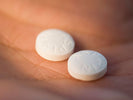
Is Aspirin a Supplement or a Drug and Should I Take One a Day?
, by Dr. Jeff Pearl, MD, 2 min reading time

, by Dr. Jeff Pearl, MD, 2 min reading time

One definition of a supplement is “something added to complete a thing; make up a deficiency; or extend or strengthen the whole”. Most of you have heard that many people take an aspirin every day “just in case”. Just in case of what? Aspirin, which is one of the oldest and most long-standing medical agents still in use, does have some useful benefits and is very low risk. In simple terms, aspirin inhibits certain functions of platelets, the blood cells responsible for clot formation.
You may have seen the commercials on television where a patient received an aspirin at the start of having chest pain (i.e. a heart attack) and is alive because of the aspirin. Although it is not that black and white, certainly rapid platelet inhibition at the early stages of a heart attack can reverse or limit the damage and might improve the outcome. Okay, you might say, I will wait until when or if that happens and then quickly take an aspirin. The odds are that you won’t have one handy or in all the commotion forget altogether. One could argue therefore, that taking aspirin regularly will protect you if a heart attack starts since it is already at work in your system.
Can taking an aspirin regularly prevent or decrease the likelihood of a heart attack in the first place? The simple answer is yes. By inhibiting platelets, aspirin along with supplements such as Omega-3 fish oil and niacin can help support and maintain a healthy heart. New theories on atherosclerosis suggest that chronic inflammation and activation of white blood cells and platelets are as important in its development as levels of cholesterol. Secondly, many acute coronary events as well as strokes are the result of acute plaque rupture and/or thrombosis with acute loss of blood flow. Once again this is a result of platelets activity which can be inhibited by aspirin. The CDC recommends daily aspirin in some people without a history of heart disease or stroke; specifically, men 45-79 years of age, and women 55-79 years of age. Talk to your healthcare provider to see if you should add aspirin to your supplement regiment. So, whether you consider aspirin a supplement or not, it does have the potential to ‘extend or strengthen the whole’.